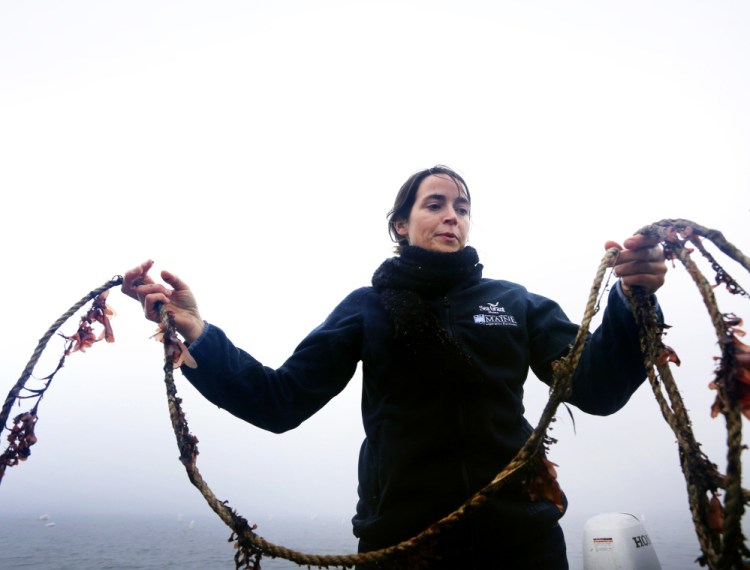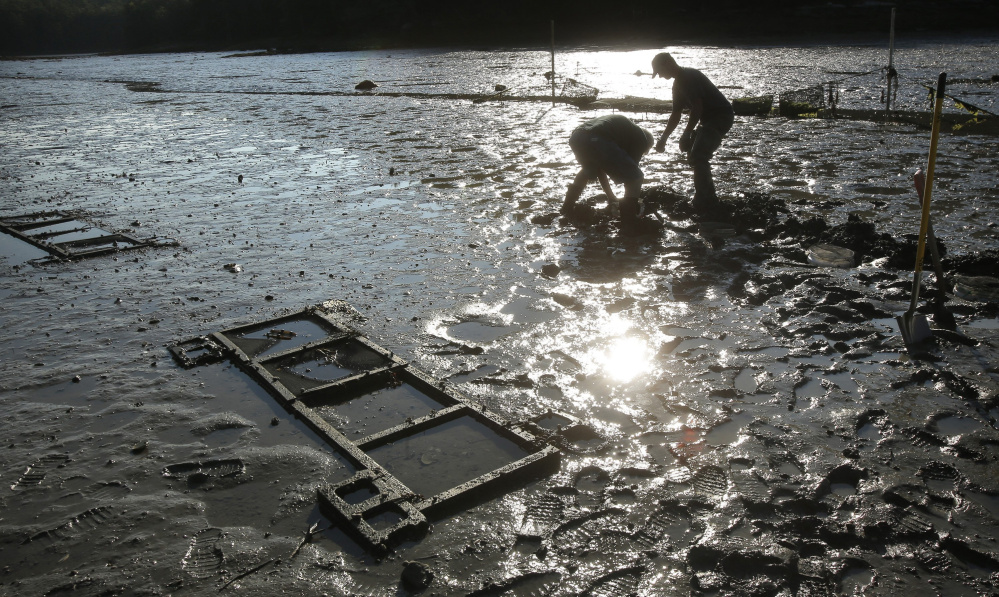A Trump administration proposal to slash funding for the federal government’s principal marine agency and eliminate the national Sea Grant program is prompting alarm in Maine’s marine sector because it depends on services provided by both.
President Trump wants to slash the budget of the National Oceanic and Atmospheric Administration – the agency responsible for fisheries management, weather forecasting, nautical surveys and assisting marine industries – by 17 percent, The Washington Post reported Friday. And he wants to eliminate NOAA’s Sea Grant program, the marine equivalent of the federal agricultural extension and research service, in the fiscal 2018 budget, which begins Oct. 1.
“There was a lot of concern when the news broke, and a flurry of messages went out to our congressional delegation from fishermen and aquaculturists who understand how they benefit from Sea Grant,” said Paul Anderson, director of Maine Sea Grant at the University of Maine in Orono, one of 33 Sea Grant universities in the country. “I don’t now if on October 1st we will all of a sudden not exist.”
The news has sent reverberations across Maine’s marine community, which has long benefited from the partnership between UMaine and the federal government. Sea Grant researchers created the Fishermen’s Forum – the industry’s premier event – in 1976, and also helped found the Portland Fish Exchange and the university’s Lobster Institute, which researches issues of concern to the industry.
It has funded groundbreaking work on how to monitor juvenile lobster populations so researchers can better predict future health of the stock; assisted mussel, scallop and kelp farmers with research and methodological expertise; developed organic certification guidelines for sea vegetable growers; and helped monitor and contain bacteria and other marine pests that plague shellfish growers and harvesters.
“People are in shock over this,” said Bill Mook, founder of Mook Sea Farm, an oyster hatchery in Bristol. “Aquaculture has been identified as a very big area for economic development in Maine, and Sea Grant, and NOAA and NOAA’s satellites are all critical to all that. This jeopardizes Maine’s ability to realize the opportunities aquaculture may afford us.”
All $73 million of Sea Grant funding would be eliminated in Trump’s fiscal 2018 budget, according to preliminary figures from the Office of Management and Budget obtained by the Post. The numbers could change as NOAA negotiates with the White House in the coming weeks, and are ultimately subject to congressional amendment or approval.
The document also proposes a 22 percent cut to NOAA’s satellite program, which may be a target because the data it collects has been used to monitor climate change. NOAA’s fisheries agency – the National Marine Fisheries Service – would face a 5 percent cut, as would the National Weather Service, which provides the data used by most meteorologists and the Weather Channel. The agency’s coastal zone management, external research and estuary reserve programs would be eliminated.
Former NOAA administrators from the George W. Bush and Barack Obama administrations told the Post that the cuts would compromise the safety of citizens and the needs of business and the military.
Patrice McCarron, executive director of the Maine Lobstermen’s Association, said the cuts to NOAA would be terrible for fishermen. “The industry relies pretty heavily on their forecast reports on the wind and the wave heights and make decisions day to day if they are going to go out, so those satellites are really important,” she said. “And nobody loves (the National Marine Fisheries Service), but keeping them fully funded and their research going is essential to manage our fisheries.”
She noted that recent cuts to the agency’s right-whale monitoring program had hurt fishermen because if scientists didn’t have time to find the whales, they had to assume they weren’t there, increasing the regulatory burden on lobstermen, whose gear the whales sometimes get entangled in.
UMaine receives $1.2 million a year from NOAA to run its Sea Grant program, and leverages another $600,000 from the state and other sources, Anderson said. The money funds scientific research, pollution monitoring, technical training, and research and development for industry, the creation of information resources for towns and businesses, and the exhibits of the Downeast Fisheries Trail, a tourist attraction. In the worst-case scenario, most funds could be cut off Oct. 1, imperiling all existing research programs and the work of the program’s extension officers, who provide expert assistance to marine industries.
“They’re not just an agency that’s funded and sits in Orono. Their people are part of our communities, and the idea that it could all disappear with the mark of a pen just shows an incredible lack of understanding of the way Sea Grant is integrated into our lives,” said Rob Snyder, president of the Island Institute in Rockland, a nonprofit that works to sustain island and coastal communities. “It’s inconceivable that we would put all these fishermen and lives and livelihoods at risk because we don’t have funding in place.”
Paul Dobbins, president of Ocean Approved in Portland, which farms kelp, said Sea Grant was essential to the birth of his industry in Maine. “A farmer in the Midwest trying a new crop or something would bring in an agricultural extension officer to their farm,” he said. “With Sea Grant, there’s this repository of knowledge and agents to play that role for us in the sea.”
The Department of Commerce declined to comment to the Post on the cuts, but a White House official who requested anonymity told the paper that the process was “evolving” and that the administration would not comment on questions about the document. The cuts would be part of the budget and subject to approval by Congress.
“I think we can all agree we would like to make America greater, but cutting this kind of thing is the way to not do that,” Mook said. “It’s like cutting off our pathway to getting greater.”
Colin Woodard can be contacted at:
cwoodard@pressherald.com
Send questions/comments to the editors.



